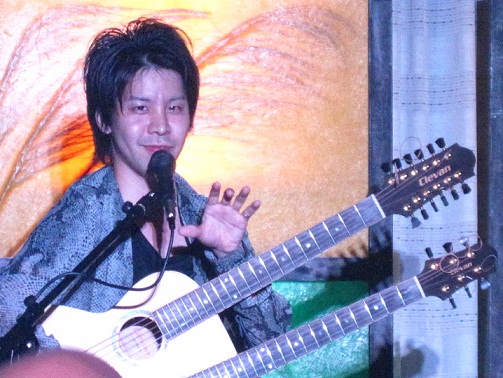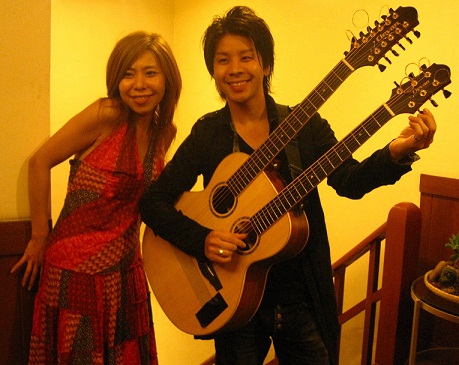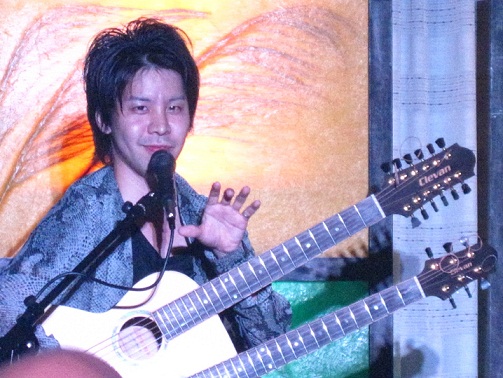Text and photos by ELIZABETH LOLARGA
 ONLY 28 and up to all sorts of tricks, as far as playing the guitar is concerned—that in a phrase is Hikaru Tanimoto. He captivated a Baguio audience in a one-night performance at Hill Station which is slowly, even unconsciously, building up a reputation as a performing arts center in this laidback city.
ONLY 28 and up to all sorts of tricks, as far as playing the guitar is concerned—that in a phrase is Hikaru Tanimoto. He captivated a Baguio audience in a one-night performance at Hill Station which is slowly, even unconsciously, building up a reputation as a performing arts center in this laidback city.
Swing Journal, a reputable magazine for jazz music, named Tanimoto among the Top 20 best guitarists, although he would be the first to aver that jazz is not his forte. He calls his technique of playing as “acoustic with tapping, finger-style guitar.”
Entirely self-taught, he says, “Guitar selected me, I didn’t select the guitar.” He confesses that as a boy, he wasn’t good in playing music: “I tried the recorder and the castanets—that was it. But guitar changed me when I watched TV. I was 14 when I saw Shinji Tanimura perform. He’s a famous singer-guitarist-composer. I longed to be like him.”
He told his parents that he wanted to start playing the guitar, starting as a bassist for a hard rock band. He wasn’t serious then, and practice was infrequent. When he was about to graduate from high school, he changed his attitude, telling himself, “I want to play from the bottom of my heart.”
He rehearsed 18 hours a day, surprising his parents but making them more supportive of his passion. Tanimoto appreciates them for “their moral support” that he considers “more important than money. “If they had opposed my music, I couldn’t be what I am today. Their opposition would’ve meant that I couldn’t be a professional musician. That to me makes them the best parents in the world,” he says.
He singled out his mother who told him, “Do whatever you dream.” Because he was still a minor when he started playing professionally, his mother doubled as his manager, arranging his schedules and guarantees and driving him to performance venues.
 When he started composing his own pieces, he found inspiration from his native Hokkaido in northern Japan. He describes it as “beautiful and temperate like Baguio” which is why he likes to return to the Philippine summer capital.
When he started composing his own pieces, he found inspiration from his native Hokkaido in northern Japan. He describes it as “beautiful and temperate like Baguio” which is why he likes to return to the Philippine summer capital.
He visited Spain, a visit that extended to four years in his desire to learn to play the Spanish flamenco. However, on his first weeks there, his entire money was stolen so he didn’t have enough to enroll in a music school. But he discovered a child street performer who could play the flamenco like a pro. In exchange for ice cream and candies, the child taught the Japanese how to play flamenco.
When Tanimoto learned enough, he emboldened himself to be a street performer, too, and played on Barcelona’s sidewalks. People, tourists and locals alive, were impressed, and dropped money into his guitar case. At day’s end, he averaged 300-900 Euros, enough for him to live comfortably.
He went on to play all over Japan, China, Korea, Taiwan, Germany. In the Philippines, he has played in Dagupan, where he is scheduled to perform again on May 30 at the Great Taste Fast Food and Pigar-pigar and May 31 at Café Du Marc, Boracay, Manila and Baguio.
For his Baguio gig, he surprised the audience unaccustomed to the sight of a double-neck guitar. He used different picks he solicited from the viewers, like a credit card and a hairpin, to produce a variety of sounds as he made a survey of world music. With just a guitar, he brought out the sitar sounds of India, the percussive music of Africa, Spain’s flamenco, American jazz (Brubeck’s “Take Five”), Japan’s koto and anime, the Caribbean rhumba, among many.
The audience responded warmly, some raising a glass of wine to toast him while he moved from table to table to enable people to see his finger-work closely. Others flashed their iPhones and digital cameras at him and similar recording instruments.
The evening’s surprise was his providing accompaniment to vocalist Eriykah Hayakawa, who also traces her roots to his hometown in Sapporo, Hokkaido, and who provided the pop music element by her covers of the ballads “Time After Time,” “More Than Words” and “An Englishman in New York,” the last involving the audience in its refrain. Hayawaka, a Sarah Vaughan fan, was effectively moving in her odes sung in her native tongue, “Sakura”, for example. Would there have been more songs in that language.
Tanimoto, who used a China-made Clevan guitar for which he is official spokesperson, promises to return to the Philippines, especially Pangasinan where he has cultivated a taste for its Bonuan bangus and pigar-pigar (a chewy beef dish).
Hill Station has hit on a winning formula with the occasional concerts it has produced. The tapas buffet, by coincidence, reflected the world music its latest performer showcased.
